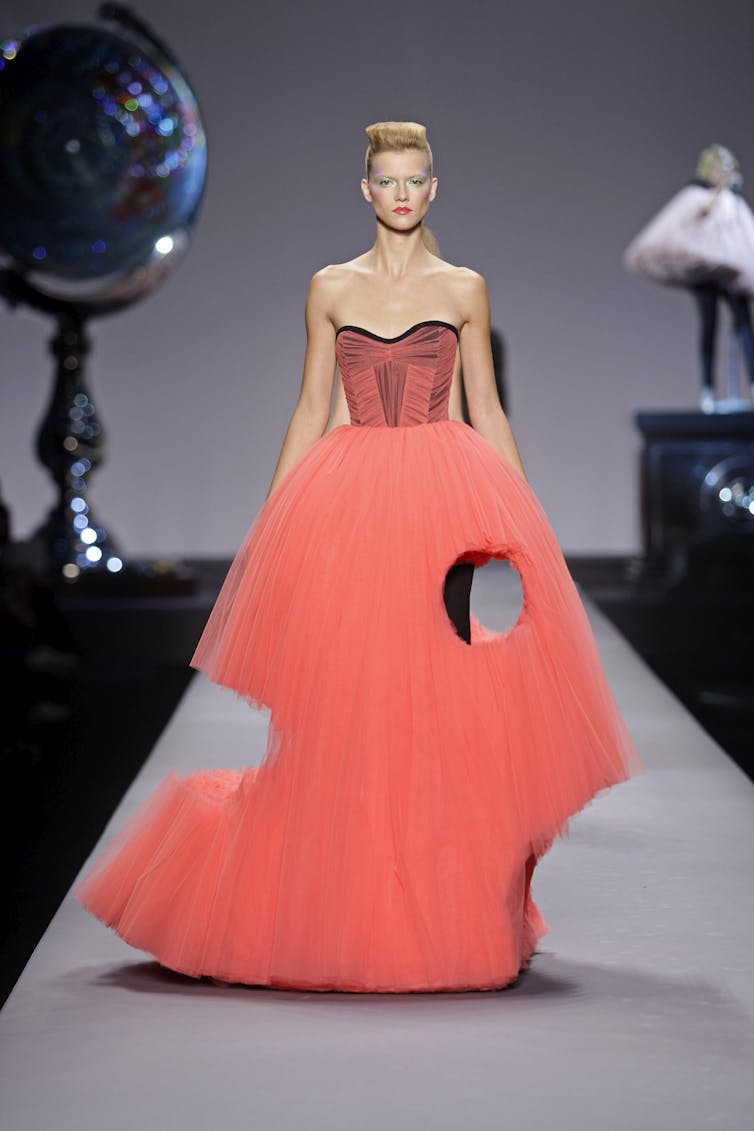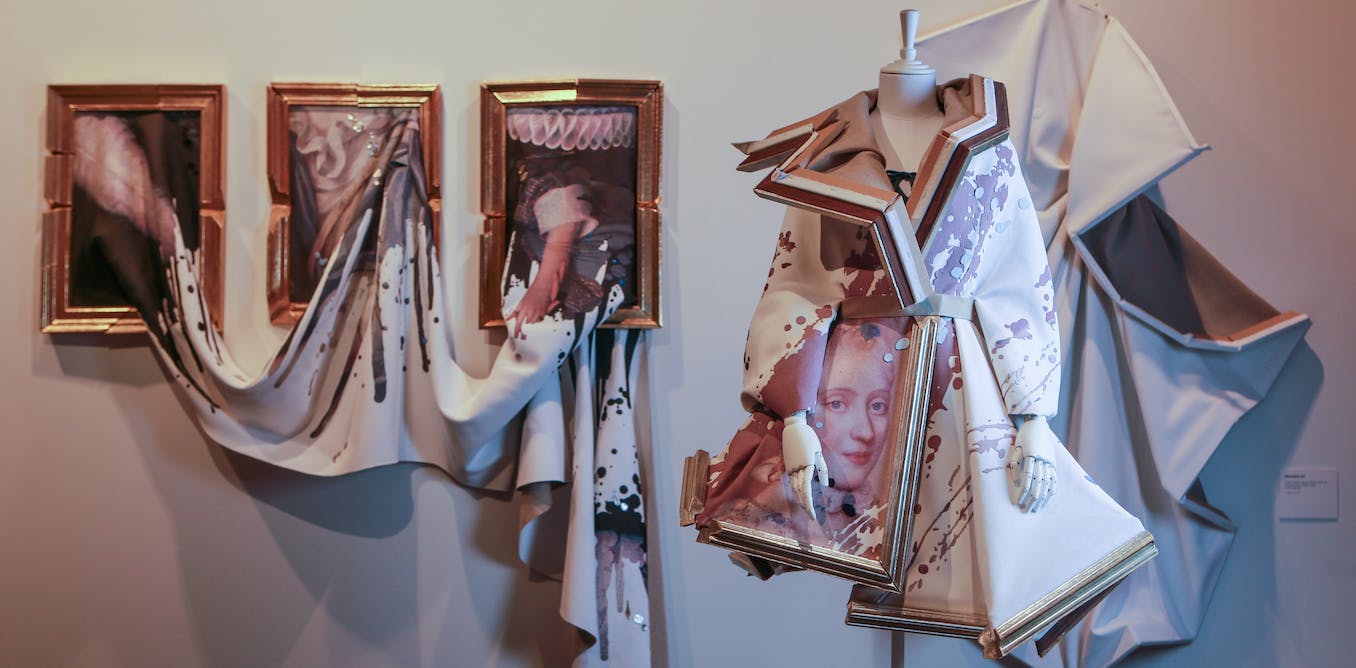the wonder of Viktor & Rolf
Viktor & Rolf: Fashion Artists at the National Gallery of Victoria celebrates the luxury of unwearable fashion. This array of stunningly executed “works” captures the remarkable career of the enigmatic Dutch duo. The exhibition, consisting of around 45 items from their collection plus installations and film, reminds us that the ideas behind a fashion show are just as important as the material things.
The works that most clearly encapsulate the exhibition’s title are those from the pair’s Wearable Art haute couture collection, autumn–winter 2015–16. Presented in the exhibition as gilt framed canvas “masterpieces”, they are cleverly engineered to transform into dresses through mind-boggling construction.

NGV/©Team Peter Stigter
When originally presented in a fashion show, the dresses were mounted on the wall. The duo then dressed a model by literally taking the picture off the wall and placing it on her body. At the NGV, some are on a wall, others are on a mannequin.
The works presented from the Russian Doll collection, meanwhile, illustrate how the pair turn fashion into performance art. In this collection – shown to viewers in its entirety at the NGV on video – a model on a rotating platform was dressed by the designers in all nine outfits consecutively. She became engulfed in clothes: from a raw jute dress to her culmination as a “Russian doll” in enlarged, embellished and caricatured silhouette, nine layers deep in fashion. (At the NGV, a selection of pieces from the collection are shown on rotating mannequins.)
Haute couture traditionally involves garments made bespoke for an individual client, which are presented first in a fashion show. It’s not just about making extreme or un-wearable fashion. Rather, it is a very specific type of fashion practice where invited designers are governed by a French body with specific codes, regulations and schedules. For most designers it is a world that only comes to them after many years of producing collections that are prêt a porter- “ready to wear” or “off the rack”.
Viktor & Rolf, however, remain both inside and outside of the world of fashion in a contemporary way. The show illustrates how they have established a type of doubled, cloaked identity within the world of haute couture.
After winning a revered fashion competition in France in 1993 and graduating from studies in the Netherlands, the duo presented their first collection in an art gallery. Their “fashion house,” based in Amsterdam for most of their career, has become a place to question, challenge and provoke critical reflection. How does a designer make a collection, for instance, and how is it presented?
For followers of fashion, many of the works in the exhibition are very familiar – images of them have circulated for so long. During the time Viktor & Rolf emerged and flourished in the 1990’s, fashion was taking off on the Internet, meaning exclusive fashion shows could be viewed and experienced by anyone. In all of the pair’s collections, the assumptions of a fashion show have been questioned and subverted. Their shows were much more theatrical than most and often, the designers were on the stage themselves dressing the models.
This is an exhibition replete with ambivalence and double entendres. For instance, an installation of Viktor & Rolf Le Parfum bottles consists of bottles that can’t be opened (containing a liquid that may be perfume), signalling the seductiveness of the “brand name”.

Wayne Taylor
Then there are the playful catwalk presentations that question the whole notion of the fashion show. One installation features a specific doll-size, purpose-built runway with a front row, lights and music. The robotic doll is the proportion of traditional Belgian half scale dolls. The viewer enters a room and takes a seat in the front row. The doll then parades down the “catwalk” wearing a piece from the designers’ recent collections.
Also in this show is a work from their Long Live the Immaterial collection – a blue ensemble that plays with the idea of the photo montage effect in post production. “Blue Screen” fabric was used in many of the pieces. For the shows, video images and footage were composited onto the clothing, playing with the divide between garment, body and image.
This exhibition presents beautifully a contemporary gaze into the exclusive world of high fashion. For the most part, it’s success – in the eyes of this fashion designer – is the opportunity it gives us to intimately look at such remarkable works in the flesh.

Cutting Edge Couture ready-to-wear collection, spring– summer 2010.
© Team Peter Stigter
After seeing so many of the pair’s clothes as images, their real life presence was, for me, more than I had imagined. When viewing a fashion show image, you don’t see how the work has been conceived as a 3D object. Up close, you realise that the designers have worked with a traditional atelier – highly skilled artisans have realised these garments. It took between 300 and 1000 hours to create some of the pieces shown at the NGV. For me, the clothes were more beautiful than I’d envisaged – and the designers’ ideas more palpable.
Pieces from the Cutting Edge Couture collection, featuring heavily layered tulle ball gowns with laser-like precision cutout and voids, played tricks on the eye.
It was hard not to reach out and touch a red bustier ball gown at the NGV, with its perfectly constructed circle cut through the hundreds of layers of tulle. You could see right through the dress.
These highly laborious confections are beyond most de rigeur practice of contemporary fashion designers. They are a far away ideal.
Viktor & Rolf Fashion Artists will run at the NGV until 26 Feb.
